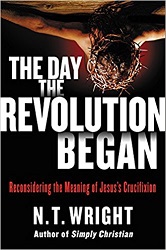
 The Day the Revolution Began
The Day the Revolution BeganReconsidering the Meaning of Jesus’s Crucifixion
Review posted October 14, 2017.
HarperOne (HarperCollins), 2016. 440 pages.
Starred Review
2017 Sonderbooks Standout: #7 Christian Nonfiction
I’ve read some popular books on the crucifixion lately – most notably Did God Kill Jesus?, by Tony Jones, and A More Christlike God, by Bradley Jersak. The George MacDonald books I’ve been reading for years were what first made me discontent with the explanation I’d been taught. I have become convinced that teaching that Jesus saved us from God does great wrong to God’s love. But how should we look at the cross instead?
Those previous books were popular reading; this one is a book for theologians. It was extremely dense and very long. The author goes deeply into Scripture and explains how his interpretation fits beautifully with what was written there. But – it’s difficult reading and even hard for me to sum up.
However, it’s also lovely. I found myself copying several sections to Sonderquotes. (Take a look there to understand better what’s being said.) N. T. Wright’s view of the cross is not about some kind of pagan sacrifice to satisfy an angry God. It’s about fulfilling God’s covenant with Israel through the forgiveness of sins.
The author places much emphasis on the fact that the early Christians summarized their “good news” by saying that “the Messiah died for our sins in accordance with the Bible.” So he looks at the question of how Jesus’ death was “in accordance with the Bible.” And he takes a fresh look at the gospels and the writings of Paul along the way.
He does blast the “works contract” or the “payment model” of the atonement as a paganized view of the cross. He points out that in Israel’s sacrificial system, the animals sacrificed were not punished for sin. They didn’t bear sin – except the scapegoat on the Day of Atonement, and that one wasn’t killed. Instead of emphasizing death, the sacrifices emphasize the blood – and it is offered as cleansing. The emphasis is on cleansing instead of punishment.
If I start quoting, I’m going to get bogged down. (Do check Sonderquotes, though it will take me awhile to get all the quotations posted.) I don’t quite know how to summarize this book concisely, but I do know it fed my soul. If this is interesting to you, and you can handle some deep waters of theology, I do strongly recommend this book. If not, let me leave you with the last paragraph:
The message for us, then, is plain. Forget the "works contract," with its angry, legalistic divinity. Forget the false either/or that plays different "theories of atonement" against one another. Embrace the "covenant of vocation" or, rather, be embraced by it as the Creator calls you to a genuine humanness at last, calls and equips you to bear and reflect his image. Celebrate the revolution that happened once for all when the power of love overcame the love of power. And, in the power of that same love, join in the revolution here and now.
